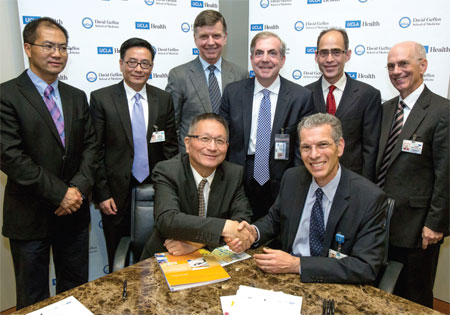UCLA will open lab in Shanghai
|
At the signing ceremony for UCLA-CTI joint venture in Shanghai are Sangem Hsu (left seated), president of CTI, and Dr David Feinberg (right seated), president of UCLA Health System, with (from left) Ren Sun and Dr Jianyu Rao (both from UCLA), Paul Fasi (CTI), Dr Scott Binder, Dr Jonathan Braun and Dr Tom Rosenthal (all of UCLA). Provided to China Daily |
A Chinese firm, the Centre Testing International (CTI) Corp plans to team up with the University of California and UCLA's department of pathology to open a unique health laboratory in Shanghai in September.
The partnership is the first between a US academic medical center and a Chinese company to create such a laboratory in China.
"More and more major US academic centers and hospital systems are interested in establishing patient-based services in China," Rao Jianyu, a professor of pathology and laboratory medicine at the Geffen School of Medicine and director of cytopathology at the UCLA Health System, told China Daily on Friday.
"It is not uncommon for major US academic centers to partner with third-party laboratories to provide diagnostic services," Rao said.
UCLA has a long tradition of academic and research collaborations with major hospitals in China, but offering direct service to patients is relatively new. The new lab will support clinical trials and enhance medical care for Chinese patients with cancer and other diseases.
Through UCLA's years of collaboration with major hospitals and academic centers in China, they have experienced firsthand how differently the two countries' medical systems work, he said.
"It will take some time for China to adapt to the concept of third-party testing, similar to how America had to adapt to changes in health insurance billing," he said.
They are confident that the technology and expertise provided through UCLA's partnership with CTI will save lives and improve care for Chinese patients, he said.
The 2,322-square-meter facility - the first of its kind in China - will offer genetic and molecular diagnostics and other sophisticated tests that exceed the scope of the average lab in China, and UCLA pathologists will train Chinese lab specialists to accurately interpret the tests, Rao said.
Modern medicine requires precise diagnostic testing at the molecular level to allow physicians to provide appropriate treatment. This is particularly true for complex diseases like cancer, where targeted new drugs are used to shrink patients' tumors.
These drugs work only if tests are able to detect specific molecular changes in the tumor tissue. Therefore, it is crucial to determine the patient's cancer type at the molecular level, he said.
"Our jointly operated lab with CTI also will offer the most current and advanced molecular tests that are difficult for the average hospital lab to perform," Rao said.
"This joint venture is founded on UCLA's desire to build strong global relationships that, through education, research and service, improve the health of people and communities throughout the world," said Tom Rosenthal, chief medical officer for UCLA Health System and co-director of UCLA's Center for World Health.
"CTI will be an outstanding partner in our effort to significantly improve patient care in China," said Scott Binder, senior vice-chair of pathology and laboratory medicine at the Geffen School of Medicine, and director of pathology laboratory services for UCLA Health System.
chenjia@chinadailyusa.com



















